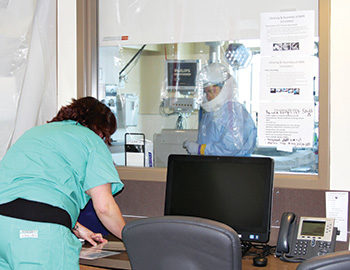The U.S. Department of Health and Human Services (HHS) has selected nine health departments and associated partner hospitals to become special regional treatment centers for patients with Ebola or other severe, highly infectious diseases.
HHS' Office of the Assistant Secretary for Preparedness and Response (ASPR) has awarded approximately $20 million through its Hospital Preparedness Program to enhance the regional treatment centers' capabilities to care for patients with Ebola or other highly infectious diseases. ASPR will provide an additional $9 million to these recipients in the subsequent four years to sustain their readiness.
Each awardee will receive approximately $3.25 million over the full five-year project period. This funding is part of $339.5 million in emergency funding Congress appropriated to enhance state and local public health and health care system preparedness following cases of Ebola in the United States stemming from the 2014 Ebola epidemic in West Africa.
Also this week:
HHS pursues development of Ebola diagnostic test
Health &Human Services Office of the Assistant Secretary for Preparedness and Response (ASPR) is pursuing a diagnostic test to quickly diagnose Ebola virus infections that can be used in doctors’ offices, clinics, hospitals and in field settings. The test, called OraQuick rapid Ebola antigen test, is being developed under a $1.8 million contract with OraSure Technologies Inc., Bethlehem, Pa. The low-cost, lateral-flow test will detect the presence of a virus with a drop of a patient’s blood or saliva on a test strip, similar to the tests used in doctors’ offices to diagnose strep throat.
Expert commentary on infection prevention in health care laundry
Infection Control and Hospital Epidemiology published a review and commentary on contemporary infection prevention issues for health care laundry and textiles in the United States. Although outbreaks of infectious diseases associated with laundered health care textiles are extremely rare, European researchers have demonstrated that oxidative laundry additives have sufficient potency to meet Environmental Protection Agency benchmarks for sanitizers and disinfectants.
FDA recalls HeartWare Ventricular Assist System
The FDA issued a Class 1 recall on HeartWare Ventricular Assist Systems due to damaged alignment guides or connection pins that may cause the pump to stop. An interruption in this electrical connection could cause serious patient injury or death. The company has reported 33 reports of malfunction and one serious injury related to this problem.
WHO identifies factors contributing to spread of MERS-CoV
At the ninth meeting of the Emergency Committee convened by the Director-General under the International Health Regulations regarding Middle East Respiratory Syndrome Coronavirus (MERS-CoV), the World Health Organization identified the main factors contributing to the spread of MERS in Korea and China. They are:
- Lack of awareness among health care workers and the general public about MERS
- Suboptimal infection prevention and control measures in hospitals
- Close and prolonged contact of infected MERS patients in crowded emergency departments and multibed rooms in hospitals
- The practice of seeking care at multiple hospitals
- Visitors staying with infected patients in hospital rooms, facilitating secondary spread of infections among contacts.





